How to Cook Hard Boiled Eggs
[ad_1]
Learn how to cook hard-boiled eggs that are perfect every single time – no guesswork here! One of the biggest challenges while cooking hard-boiled eggs is to prevent them from getting overcooked. Overcooked eggs develop a pale-yellow yolk, a green-grey ring around it and also taste a bit weird. Not appetizing at all!
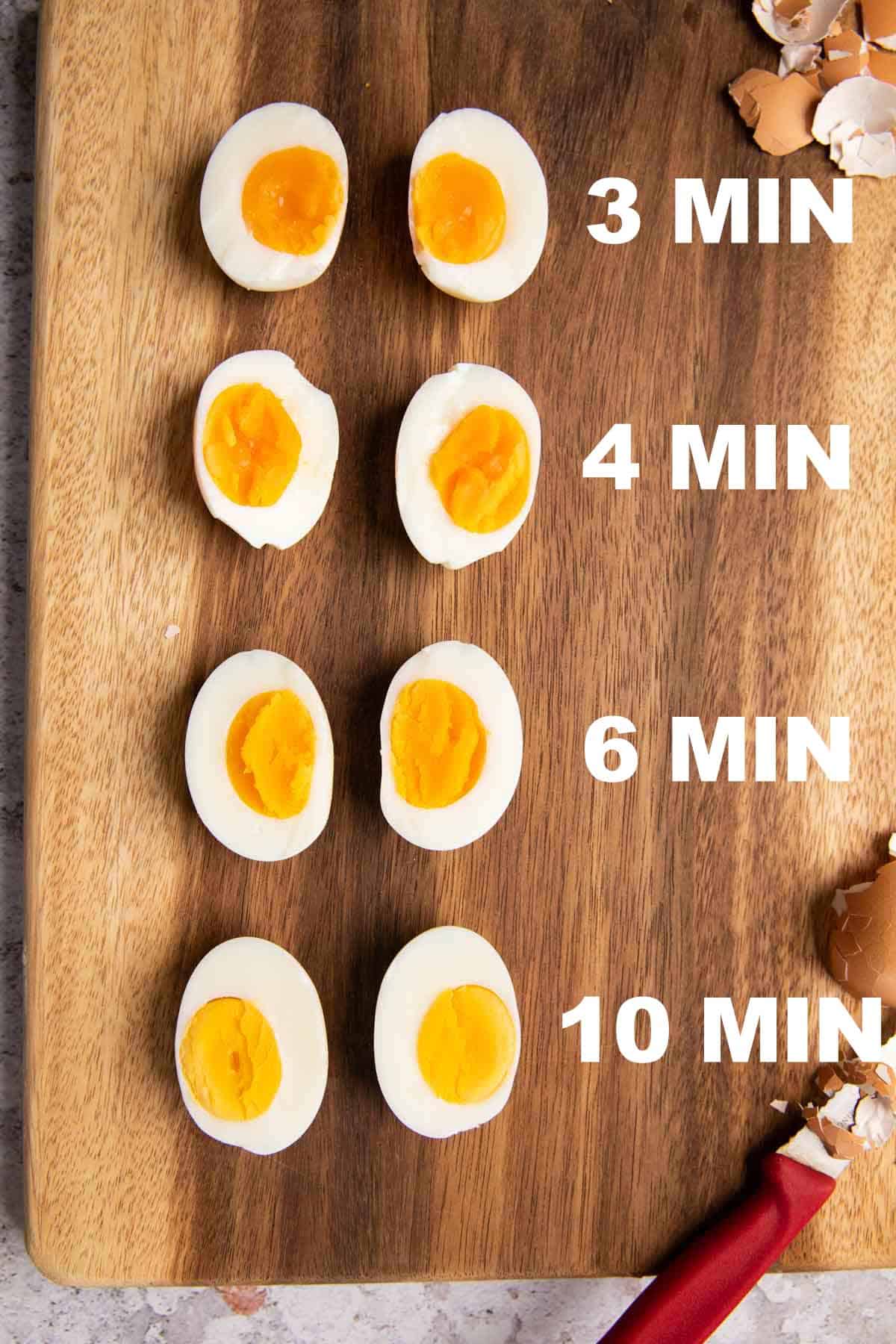
Is this something you struggle with? Don’t worry, I have got you covered! In this post I am sharing all the steps to make the perfect hard-boiled eggs along with my top tips to get it right each time. This is a fool-proof method, and even though it takes a few minutes longer than simply boiling them in hot water, it is SO worth it!
Love Eggs? Try Spicy Bacon Devilled Eggs, South Indian Egg Curry and Egg Tadka!
How to cook hard-boiled eggs – my fail-proof method
Step 01: Start with placing your eggs in a pot or saucepan and fill it up with room temperature tap water. Make sure the eggs are fully submerged in water. Turn on the flame and bring the water to a rolling boil over high heat.
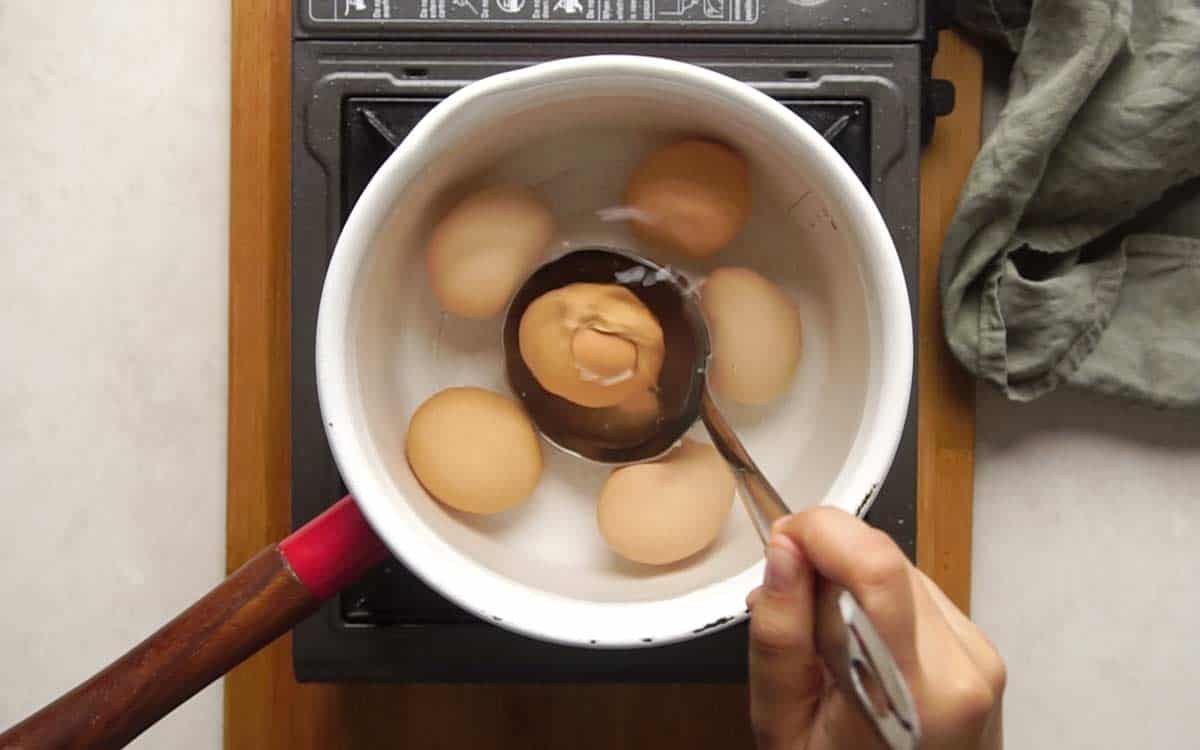
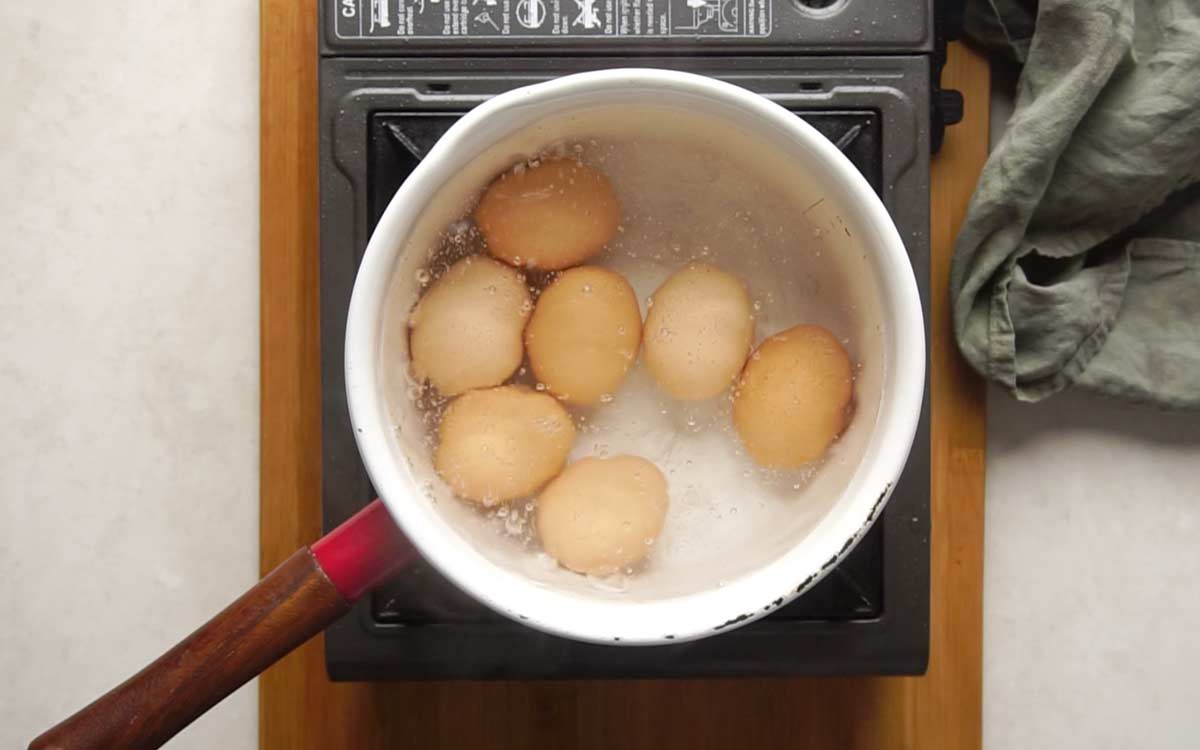
Step 02: Once the water comes to a rolling boil, turn off the flame and cover the saucepan with a well fitting lid. Set a timer and let the eggs sit in hot water for 10 minutes for perfectly boiled eggs. If you like your egg yolk more yellow than orange, add two more minutes.
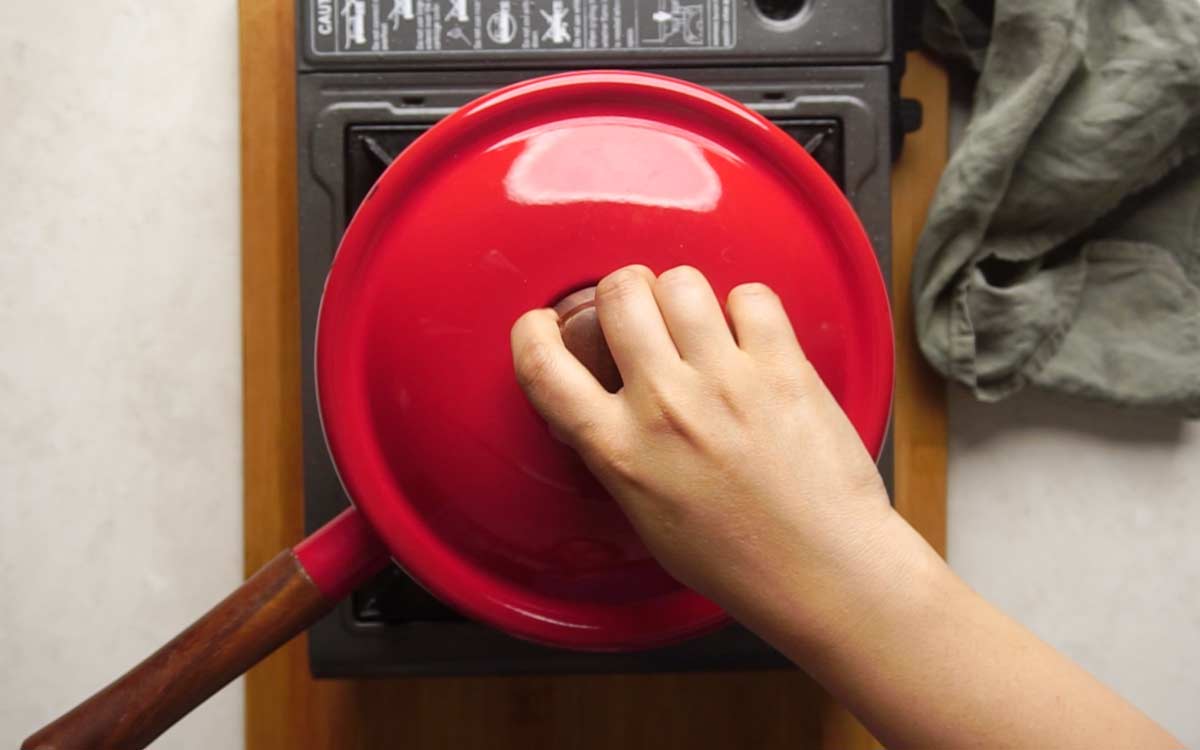
Step 03: After 10 minutes, remove the eggs from hot water and transfer them to a large bowl of ice water. Leave the eggs in there until they’re cool enough to handle and peel.
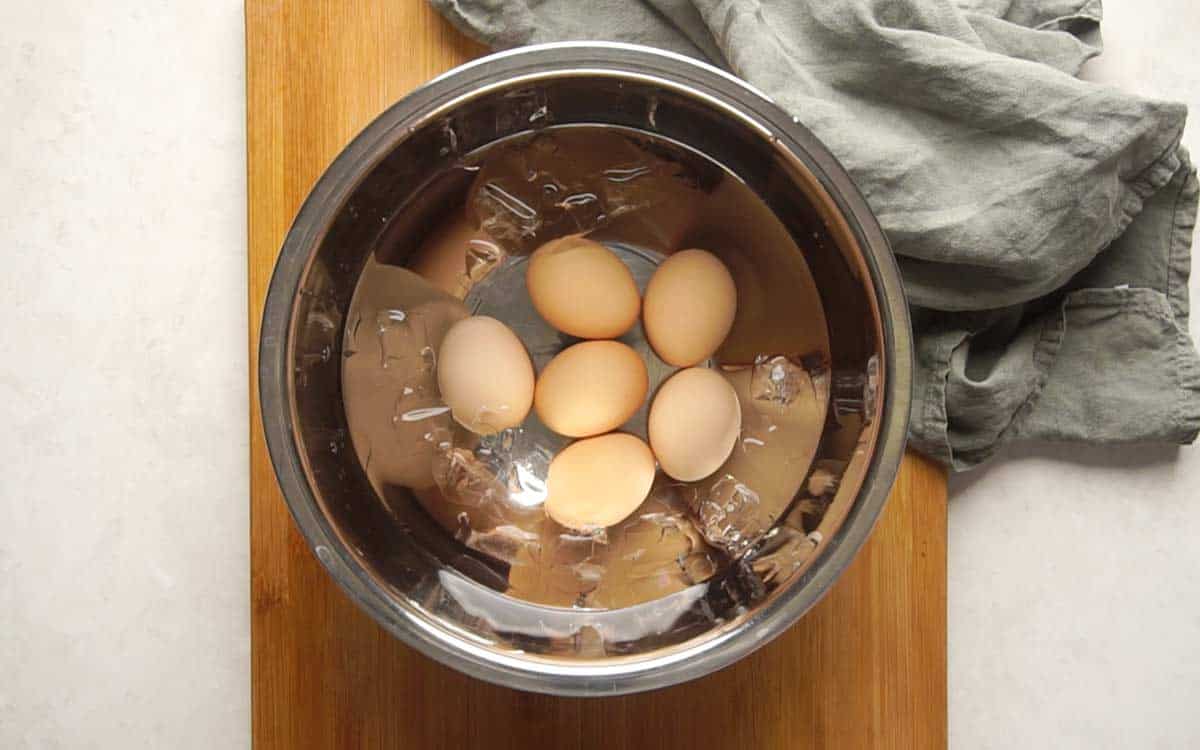
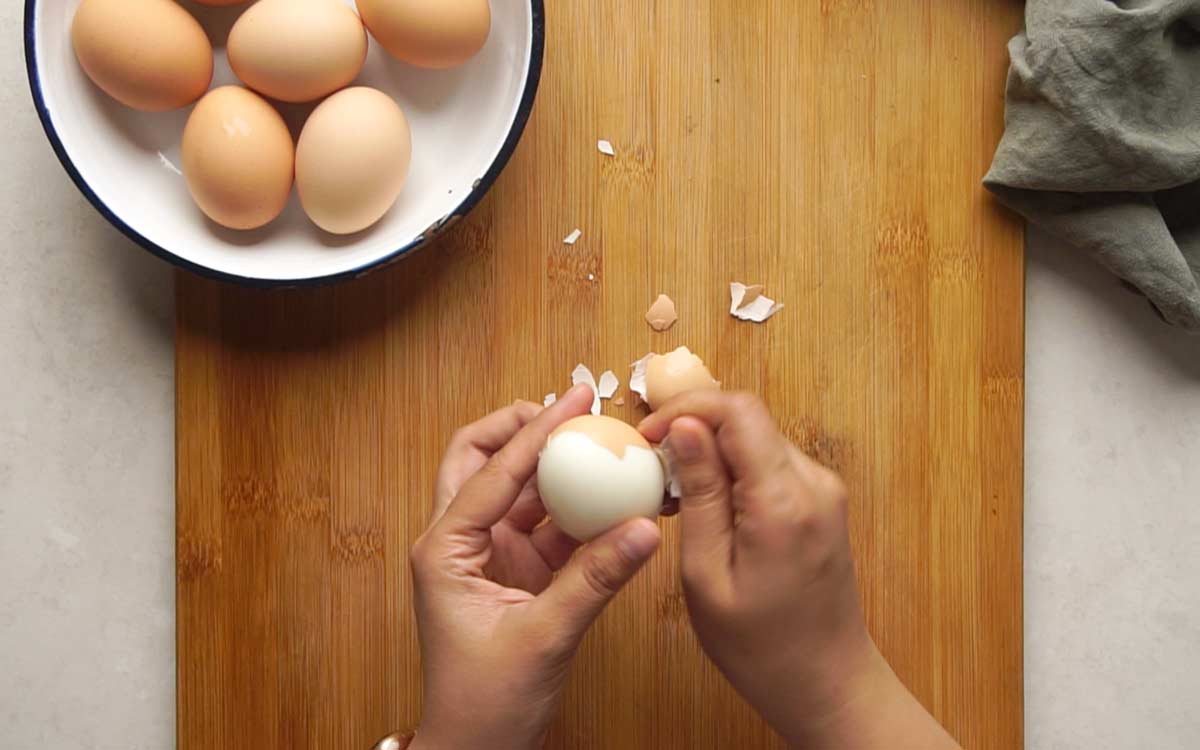
The Best Way to Cool Boiled Eggs
Once you remove the eggs from hot water, immediately transfer them to a bowl of ice water. Ice water bath helps bring down the temperature of the eggs immediately and stops the cooking process.
How to Easily Peel Hard-Boiled Eggs
Peeling hard-boiled eggs can prove to be a bit of a challenge for the best of us. While there isn’t an exact science when it comes to this, here are some tips that will help:
- Consider using slightly older eggs as they are relatively easier to peel as compared to newer ones.
- Adding a little salt to the water when boiling the eggs helps separate the shell more easily from the white.
- Placing boiled eggs in an ice bath for at least 5-7 minutes brings down the temperature of the eggs, and that in turn makes it easier to peel them.
- Peel the eggs under running water while peeling. The water seeps into the shell and makes them easier to peel
- Or crack them all-around and soak them in water for 5 minutes. Water seeps into the shell, and it peels easily
- Cracking the eggs from the larger end also helps peel the egg more easily because this is where the egg’s air pocket is. This makes it a lot easier to peel the shell in larger pieces.
Top tips to keep in mind when hard boiling eggs:
- Choose eggs that are at least a week to 10 days old to achieve perfect results each time. Older eggs are better to hard boil than newer ones. They are also a lot easier to peel.
- Refrigerating your eggs for at least a week or two also makes a huge difference in how the hard-boiled eggs turn out.
- If your eggs are difficult to peel, crack them all-around and soak them in water for 5 minutes. Water seeps into the shell, and it peels easily
- Adding a teaspoon of vinegar or salt to the water when boiling prevents the egg white from running out in case the shell breaks open while cooking. Salt also makes it easier to peel the egg once cooked.
- It’s important to place the eggs in ice cold water to stop the cooking process. Don’t miss this step or your eggs can overcook
Why does my egg yolk turn greenish?
That grey-green ring around the yolk of a hard-boiled egg is a result of overcooking. When the egg is overcooked, the sulphur in the yolk reacts with the hydrogen in the white, resulting in that dreaded ring and a slightly weird pasty taste. Boiling the egg in just water does not provide you with a clear time frame for which it must be cooked, making it really easy to overcook it.
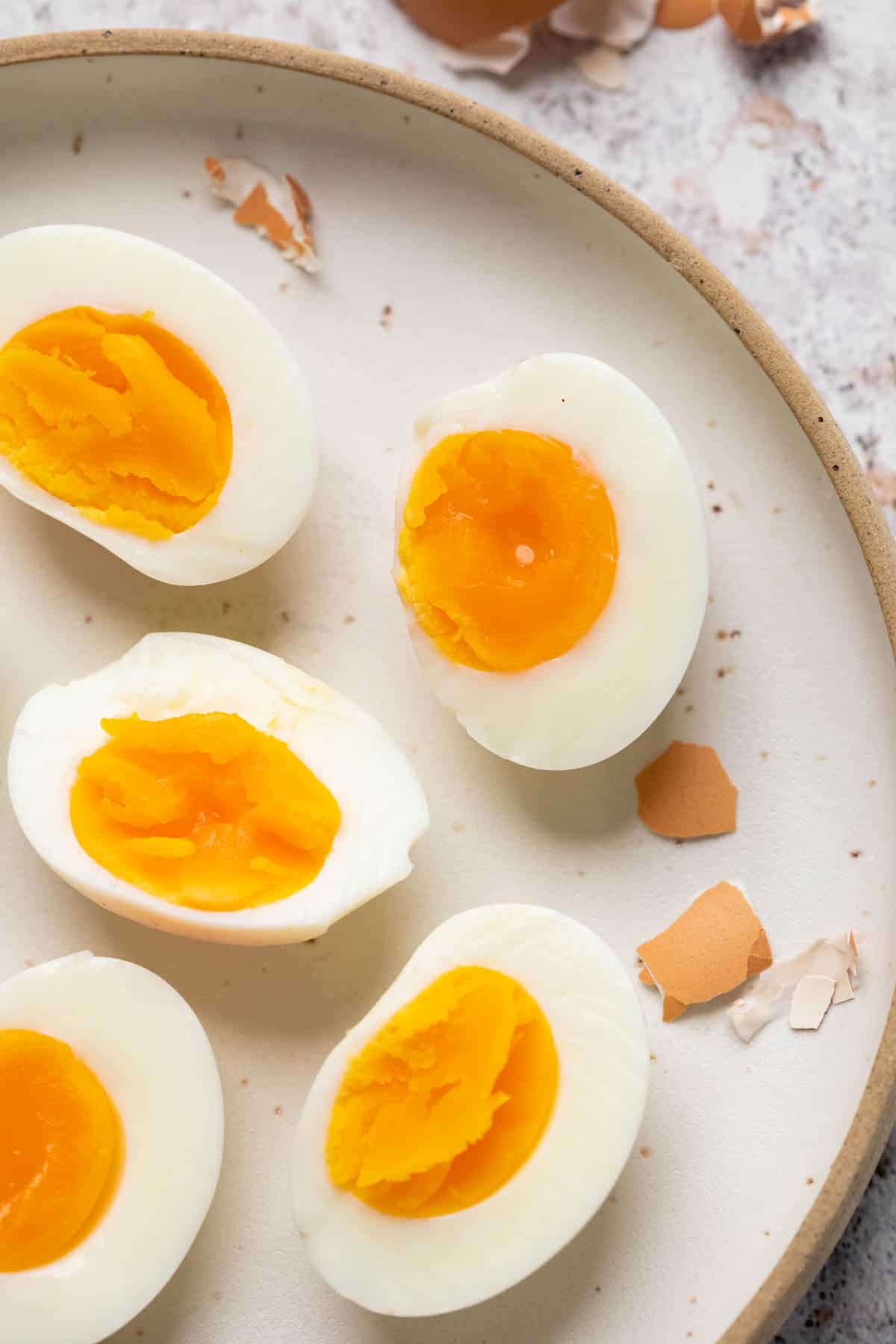
Where to use hard-boiled eggs?
Apart from making a yummy, healthy snack just by themselves, there are a lot of ways to use hard-boiled eggs. From curries and rice dishes to starters and salads, hard-boiled eggs make for a great addition to almost any meal. Some of my favourite recipes using hard-boiled eggs include this super quick and simple egg tadka starter. It is the perfect thing to make when you want a delicious appetizer without spending hours putting it together. The South Indian style egg curry is another great egg recipe that you need to try. Apart from the incredible, wholesome flavours, I love that this dish uses simple pantry ingredients. Also don’t forget to try the Spicy Bacon Deviled Eggs. I usually make a large batch of these when hosting a party, and it’s the first thing to disappear
Oh, and the best thing about cooking hard-boiled eggs this way is that even if you leave the eggs in the water for a little bit longer, you’ll only end up with a paler and chalkier egg yolk, but no green ring for sure! Pretty cool, right!?
LOVE THIS RECIPE? Subscribe to my newsletter and be the first to receive all new recipes!
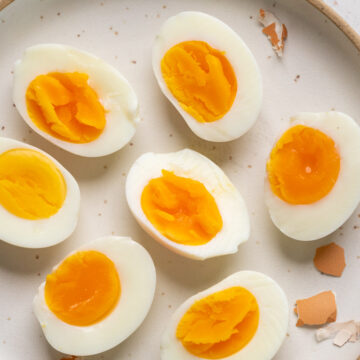
How to cook Hard Boiled Eggs
Here’s a quick step by step method showing you how to cook hard-boiled eggs. This foolproof method results in perfectly set whites and yolks that are just right, resulting in an amazing hard-boiled egg!
Print
Pin
Rate
Servings: 6 eggs
Instructions
-
Place eggs in cold water in a saucepan
-
Bring the water to a roaring boil. Once it starts boiling, turn off the flame and cover the saucepan. Set a timer for 10 minutes or your desired time based on the level of doneness you like. For perfect hard-boiled eggs, 10 minutes is optimum.
-
Get an ice bath ready in a large bowl. Once the timer goes off, immediately transfer eggs to the ice bath to stop the cooking process and cool them.
-
Once cool, crack the shell and peel the eggs to enjoy. Unpeeled hard-boiled eggs can also be refrigerated for later.
Notes
- Choose eggs that are at least a week to 10 days old to achieve perfect results each time. Older eggs are better to hard boil than newer ones. They are also a lot easier to peel.
- Refrigerating your eggs for at least a week or two also makes a huge difference in how the hard-boiled eggs turn out.
- If your eggs are difficult to peel, crack them all-around and soak them in water for 5 minutes helps. Water seeps into the shell, and it peels easily
- Adding a teaspoon of vinegar or salt to the water when boiling prevents the egg white from running out in case the shell breaks open while cooking. Salt also makes it easier to peel the egg once cooked.
- It’s important to place the eggs in ice cold water to stop the cooking process. Don’t miss this step or your eggs can overcook
[ad_2]
Source link
